WhatsApp has transformed the way people connect instantly, securely, and globally.
From personal chats to business communications, this app sets the benchmark for modern messaging platforms.
If you're planning to develop a chat app like WhatsApp, understanding its core features, architecture, and growth strategies is essential.
With over 2.8 billion users in 2025 and expanding integrations with AI and cross-device sync, WhatsApp is more than just a messenger; it's a global communication hub.
This guide offers a comprehensive roadmap to build a custom messaging app like WhatsApp, complete with features, monetization models, tech stack, and development insights tailored for entrepreneurs and product teams.
Key Takeaways:
Developing a chat app like WhatsApp in 2026 offers a strong blueprint for scalable and secure communication platforms.
Success depends on integrating privacy-first features, community tools, and real-time functionality.
Learning from failed apps can help avoid common issues like poor monetization or weak user retention.
Building a WhatsApp like app helps businesses tap into the growing demand for private, fast, and reliable communication.
The app development journey involves defining features, choosing the tech stack, designing UI/UX, building, testing, and launching the platform.
A mix of freemium, B2B, and API monetization strategies can ensure business viability.
JPLoft brings hands-on experience and strategic guidance to help you launch a successful chat application.
What Is WhatsApp Messenger and How Popular Is It in 2026?
"The simpler you make things, the more effective they become." — Brian Tracy.
This quote reflects WhatsApp’s core strength: simplicity.
Launched in 2009, WhatsApp Messenger transformed global communication with its real-time, encrypted messaging.
Now under Meta’s umbrella, WhatsApp offers more than just texting, from voice and video calls to group chats, business messaging, AI-based automation, and cross-device syncing.
1. WhatsApp in Numbers
-
2.8+ billion active users globally
-
100+ billion messages exchanged daily
-
Over 1 billion voice/video calls are made every day
-
Dominates usage in 180+ countries, especially India and Brazil
-
200+ million businesses using WhatsApp Business
WhatsApp’s evolution has helped it stand among the best social media apps by constantly innovating its ecosystem. The platform now doubles as a customer service channel, digital storefront, and internal communication tool for enterprises.
2. Latest Features
-
AI-generated stickers for expressive messaging
-
Multi-account support on one device
-
Message editing up to 15 minutes after sending
-
Chat lock with Face ID for private conversations
-
Improved HD media sharing for high-quality photos and videos
These feature enhancements show how WhatsApp is not just a messaging platform anymore; it’s a scalable ecosystem for both personal and business communication.
Why Should You Develop a Chat App Like WhatsApp in 2026?
Building a communication platform like WhatsApp isn’t just about duplicating its features; it’s about tapping into user expectations, market gaps, and future trends.
Here’s why it makes sense to develop an app like WhatsApp in 2026:
1] WhatsApp’s Market Success Sets a Strong Blueprint
With over 2.7 billion users, WhatsApp’s success proves that simple, private communication has immense global demand. If you're looking to make an app like WhatsApp, this is your cue to enter a proven space.
2] Privacy & Core Features Are Non-Negotiable
Today’s users expect encrypted messaging, fast syncing, and privacy-by-design. These social media app features are now baseline expectations when you create a WhatsApp like app.
“In a recent conference, WhatsApp Head Will Cathcart emphasized the platform's commitment to privacy-first innovation, highlighting features like chat lock, edit sent messages, and seamless multi-device syncing. These enhancements reflect what modern users expect from messaging platforms—real-time control, security, and convenience.”
3] Trends Show a Shift Toward Community-Based Apps
Recent social media app development trends indicate a rise in interest-specific communities. A WhatsApp like app development model focused on niche audiences gives you a competitive edge.
4] Standing Out with Innovation and Experience
Unlike traditional apps, there’s space to differentiate with voice assistants, smart replies, or chatbots. Knowing how to create a social media app that integrates AI will be a game-changer in the coming years.
5] Learn From the Pitfalls of Failed Apps
Many apps fail due to poor performance, UX issues, or a lack of monetization. Understanding why social media apps fail helps you plan better when you develop WhatsApp like app experiences.
6] Build a Scalable Startup with a Focused Roadmap
If you’re planning to start a social media business, WhatsApp’s evolution offers valuable inspiration. Whether you're building for enterprises or global users, a chat app like WhatsApp development serves as a strong blueprint for sustainable growth.
7] Monetization Opportunities Are Expanding
From subscription models to in-chat payments, understanding the mobile app monetization guide can turn your app into a long-term, scalable business.
After considering all these reasons, let’s explore the features to integrate into WhatsApp in the following section.
What Are the Must-Have Features in a WhatsApp-Like Chat App?
If you want to create an app like WhatsApp that resonates with today’s users, feature parity isn’t enough; you need enhancements.
Below are the core features that any WhatsApp-like app must have, with thoughtful additions that align with evolving user expectations.
1. One-to-One Messaging
Enable secure, real-time communication between users. This core component forms the foundation when you set out to make an app like WhatsApp.
2. Group Chats
Facilitate community-building with group messaging capabilities, including mentions, admin controls, and media sharing.
3. Voice and Video Calling
Integrate HD audio and video calling to compete with top Skype alternatives, ensuring low latency and reliability even on weaker networks.
4. End-to-End Encryption
Privacy isn’t optional. Secure your app with encryption standards similar to WhatsApp, which boosts your app’s credibility and ensures compliance with global regulations, especially if you're planning to create a messaging app like WhatsApp.
"WhatsApp continues to refine its user experience with recent additions like 'Message Edit' (editable within 15 minutes of sending), chat lock with fingerprint/passcode, and the expansion of multi-device functionality without requiring your phone to stay online. Including such modern enhancements can make your app stand out."
5. Status/Stories Feature
Borrowed from social platforms like Snapchat, this feature boosts engagement. It’s now a standard for modern communication apps.
6. Multimedia Sharing
Let users send images, videos, documents, and audio clips. This supports user retention and keeps conversations dynamic.
7. Push Notifications
Keep users updated on new messages or activity. Personalization of push alerts improves engagement and daily active usage.
8. Cross-Platform Syncing
Ensure seamless syncing across devices and operating systems. This enhances user flexibility, crucial if you're pursuing WhatsApp like app development Android and iOS versions simultaneously.
9. User Profile Customization
Allow users to edit their profile info, set status messages, and personalize chat backgrounds.
10. Chat Backup and Cloud Sync
Users expect to back up and restore their chat history effortlessly. Integrate with cloud providers to make this a seamless process.
11. Contact Integration & Search
Automatically pull contacts from the device and enable robust search functionalities across chats and messages.
12. AI-Powered Chatbots & Moderation (Advanced)
Consider integrating smart bots for auto-replies, moderation, or assistance, especially if you plan to scale and create a messaging app like WhatsApp with added automation.
13. In-App Payments (Optional but Growing)
WhatsApp’s move into UPI payments in India is a sign of things to come. Monetization is no longer limited to ads; fintech features are gaining ground. Consider studying successful mobile messaging app monetization strategies for guidance.
14. Admin Dashboard & Analytics
For those looking to create a social media app like WhatsApp, having a robust backend to manage users, analytics, and reports is key.
"Innovation is saying no to a thousand things." — Steve Jobs.
A great app isn’t about having every feature; it’s about having the right ones, optimized for your audience.
How to Build a Chat App Like WhatsApp: Step-by-Step Guide
Building a successful messaging app like WhatsApp requires strategic planning, the right tech stack, and feature-rich execution. Here’s a clear step-by-step breakdown to help you build a high-performance, secure, and scalable chat app from scratch.
Step 1: Define Your Target Audience and Niche
Before development begins, determine who your app is meant for: personal users, enterprise teams, or private communities.
Having clarity here sets the foundation for app design and monetization. Many founders explore how to start a social media business to align with product-market fit from day one.
Step 2: Decide Core Features and Security Framework
Must-have features include real-time chat, group messaging, media sharing, and status updates. Strong encryption is vital to protect privacy. Understanding social media app security ensures your app is built with robust protection against data leaks and breaches.
Step 3: Choose the Right Tech Stack for Performance
Selecting the right tools is crucial. Technologies like Erlang (used by WhatsApp), WebSockets for real-time updates, and scalable cloud backends are popular picks. Learn from proven mobile app tech stack models to future-proof your app for millions of users.
Step 4: Focus on Design That Boosts User Retention
Design drives stickiness. Go for clean UI, gesture-friendly controls, and fast transitions. Refer to mobile app design best practices like minimalism and accessibility to deliver an experience users love and return to daily.
Step 5: Develop and Integrate Key Modules
This includes message syncing, media compression, contact management, and notification systems. Plan your architecture well if you intend to scale. If needed, create an app blueprint that supports modular development and dynamic feature rollouts.
Step 6: Test, Launch, and Continuously Iterate
Ensure comprehensive QA covering load testing, UI/UX audits, and security reviews. Launch gradually, collect feedback, and iterate. For those planning to make a free chat app like WhatsApp, this step ensures you’re delivering value without overspending.
If the in-house team lacks expertise, consider hiring dedicated developers who specialize in chat app development for robust execution.
From identifying your niche to choosing the right developers and stack, this process lays the groundwork for a scalable messaging platform. Next, let’s break down how much it actually costs to develop an app like WhatsApp in today’s tech economy.
How Can AI Be Used to Build an App Like WhatsApp?
AI is reshaping how modern messaging apps function, from smart replies to real-time translation.
WhatsApp has already begun integrating generative AI, and the trend is only accelerating in 2025. Here's how to effectively build AI capabilities into your WhatsApp-like app.
► Integrate Smart Chatbots
AI-driven chatbots can handle FAQs, appointment bookings, and support queries. This enhances engagement and reduces manual workload. Make sure your team follows best practices from an experienced AI app development company to ensure efficient integration, scalability, and long-term performance of your AI-powered chat solution.
► Use Generative AI for Content
Meta has integrated Meta AI into WhatsApp, allowing users to generate images and get answers within chats. You can achieve similar capabilities when you build an AI app with advanced models like GPT or Llama.
► Personalization Through AI Algorithms
Use AI to analyze behavior and deliver personalized content, suggested replies, recommended groups, and smart media sorting.
► Integrate AI Voice and Video Features
AI-enhanced voice modulation, background noise removal, and auto-captioning improve accessibility and experience.
► Secure AI Features with Robust Design
With AI managing user data, focus on building privacy-first interfaces. Learn more from detailed guides like how to design a social media app to ensure seamless and secure UX.
► Future-Proof with Maintenance Planning
AI models evolve rapidly, so timely updates and monitoring are key. Explore the importance of long-term planning through this social media app maintenance guide.
Leveraging AI is now essential if you want to create an app like WhatsApp that offers personalized experiences, smart interactions, and contextual automation.
Up next, let’s decode the actual cost to make an app like WhatsApp and what drives pricing in AI-rich messaging platforms.
What’s the Cost to Make an App like WhatsApp?
Building an app like WhatsApp can cost anywhere between $25,000 and $120,000+, depending on the features, complexity, AI integration, technology stack, and the location of your development team. If you’re planning to develop a chat app like WhatsApp, your budget should factor in advanced AI, security, and real-time capabilities from the start.
This section breaks down each factor that impacts the overall app development cost.
A] App Features and Complexity
The cost significantly depends on features like messaging, voice/video calls, file sharing, encryption, etc. Adding real-time AI capabilities raises the budget further.
B] Development Team Location
Hiring developers from the US or Western Europe can cost more than choosing teams in South Asia. If you want to manage your budget smartly, consider partnering with a mobile app maintenance services provider for post-launch support, too.
C] Platform Choice: Android, iOS, or Both
Developing for both platforms (cross-platform) increases costs compared to launching on one platform initially.
D] Technology Stack & Backend
Server infrastructure, database, messaging protocols, and security layers contribute a major share. Get clarity on choices through this detailed mobile app testing approach to ensure your tech stack supports growth.
E] App UI/UX Design
Modern designs with user-friendly flows cost more but also boost retention. Learn from established UI/UX principles to strike the right balance between usability and innovation.
F] Maintenance & Upgrades
Ongoing maintenance is critical for performance, bug fixes, and adapting to OS updates. Long-term planning avoids future cost spikes. Refer to mobile app maintenance for best practices.
G] Estimated Cost Range
-
Basic MVP: $25,000 – $40,000
-
Mid-Complex App with AI: $60,000 – $100,000
-
Full-featured Global App: $120,000+
If you’re comparing budgets, understanding the cost to develop an app like Instagram can also provide useful context, especially regarding backend architecture and user interaction depth.
This section helps answer: how much does it cost to develop an app like WhatsApp? Depending on your scope, budget, and tech stack, it varies significantly.
Ready to invest? The next section will walk you through how to monetize your WhatsApp clone app and ensure ROI from Day 1.
How Can You Monetize a WhatsApp-Like App?
Monetizing an app like WhatsApp isn’t just about ads; it’s about aligning your revenue model with user experience.
Let’s explore the most effective strategies and how similar platforms are succeeding by following how social media makes money. Also, you are being provided with insights into how to develop a chat app like WhatsApp for long-term profitability.
“According to WhatsApp’s leadership, the focus for the coming years is “private, fast, and reliable communication”—a philosophy startups can adopt to differentiate their own apps. New feature rollouts are often driven by direct user feedback and privacy standards, providing a roadmap for competitive innovation.”
1. Freemium Model with Premium Add-ons
To create an app like WhatsApp that scales sustainably, offering core features for free and charging for extras like custom themes, additional cloud storage, or animated sticker packs works well. Platforms exploring Discord alternatives and community-driven messaging apps often use this to grow users while generating incremental revenue. It’s a smart way to build a custom messaging app like WhatsApp without forcing paywalls upfront.
2. Subscription-Based Monetization
Introduce monthly or yearly plans for advanced options like encrypted backup, multi-device syncing, or early access to beta features. Apps targeting Snapchat alternatives follow this model to lock in steady revenue. When planning the steps to build a WhatsApp like messaging app, this stream offers predictability and appeals to premium users.
3. API Access and White-Label Licensing
If you're aiming to develop a chat app like WhatsApp for businesses, offering API integrations and white-labeled versions can open up B2B monetization. This is commonly done in clone-based projects, studying the cost to develop an app like MeWe. It’s important to plan your features and backend around your social media app development cost to ensure this model stays profitable at scale. APIs also cater to platforms interested in how to scale and develop an app like Reddit with third-party connectivity.
4. Native Ads & In-Chat Promotions
Carefully placed native ads, banners, or even sponsored chatbot messages can generate consistent revenue. However, navigating social media app development challenges is crucial here; ads should never disrupt the user experience. If you’re figuring out how to build a free chat app like WhatsApp, ad monetization can offer initial revenue without pushing away users.
5. Partner Ecosystem & Data Insights
Advanced apps that develop an online mobile app like WhatsApp can monetize by creating integrations with e-commerce, fintech, or customer service tools. Additionally, anonymized analytics (while maintaining compliance) can unlock business insights, a route often taken by top mobile app development companies in the USA. Companies that aspire to be the best mobile app development company in the messaging space prioritize this hybrid strategy.
Want to know how to build a free chat app like WhatsApp or make a WhatsApp like free app that balances revenue and user satisfaction? The key lies in selecting a model that evolves with your user base and platform goals.
Build Your Dream App Like WhatsApp with JPLoft
If you're ready to transform your idea into a dynamic messaging platform like WhatsApp, partnering with the right team is crucial.
JPLoft is a trusted social media app development company offering end-to-end solutions from concept validation and feature planning to secure development, AI integration, and post-launch maintenance.
With our proven expertise and client-focused approach, we help startups and enterprises launch scalable and high-performing messaging apps.
Let’s bring your WhatsApp-like app idea to life on time, on budget, and beyond expectations.
Conclusion
Creating an app like WhatsApp involves thoughtful planning, from defining core features to choosing the right development approach. Success hinges on delivering seamless messaging, strong privacy protections, and user-friendly design. Whether for startups or enterprises, a WhatsApp-like app can offer immense value by connecting people across the globe.
By following the steps in this guide, considering essential functionalities, and ensuring proper scalability, you can confidently create an app like WhatsApp that connects people across the globe. Let your vision lead the way, backed by the right technology and strategy.
FAQs
The cost to build an app like WhatsApp typically ranges between $30,000 and $150,000, depending on features, tech stack, and location of the development team.
Essential features include real-time messaging, voice/video calls, group chats, end-to-end encryption, multimedia sharing, contact sync, and push notifications.
Development time varies but generally takes 4 to 9 months based on complexity, platform choices (iOS/Android), and integration requirements.
Yes, AI can enhance your app with features like chatbots, smart replies, language translation, and automated moderation for better user engagement.
JPLoft offers custom messaging app development with robust architecture, skilled developers, and proven expertise in real-time communication technologies.
To develop a chat app like WhatsApp, start with a clear product vision, define your audience, select a scalable tech stack, integrate AI-powered features like smart replies and chatbots, and focus heavily on UX design and privacy. Partnering with experienced developers can speed up the process while ensuring security and performance.





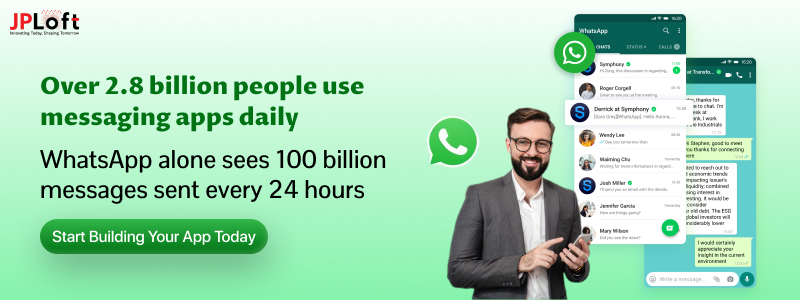
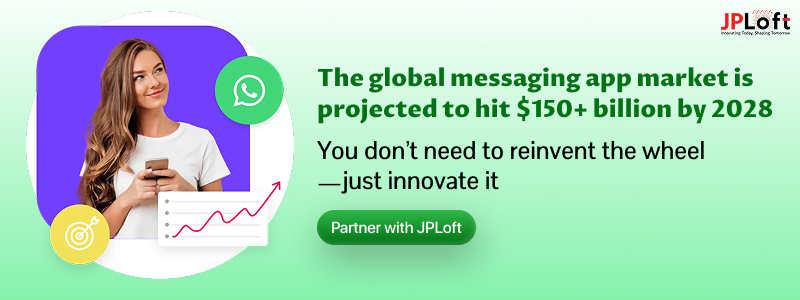

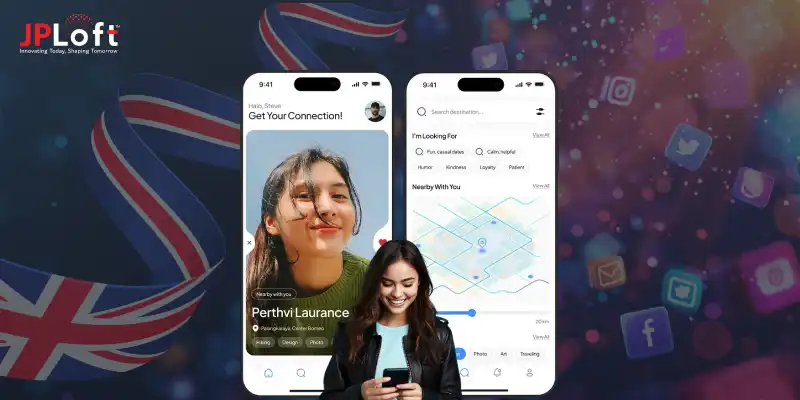
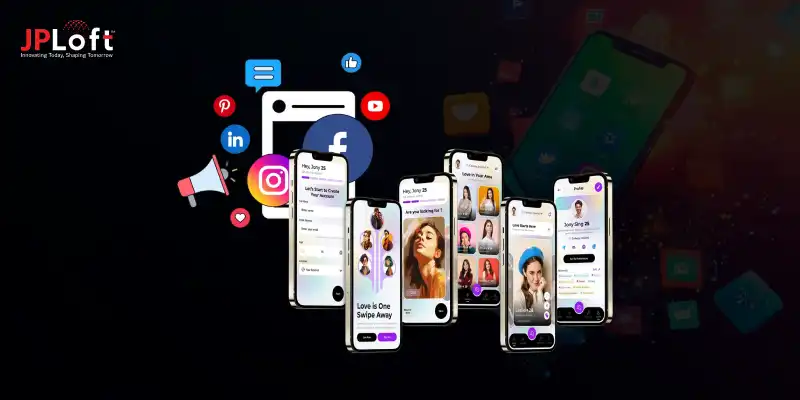
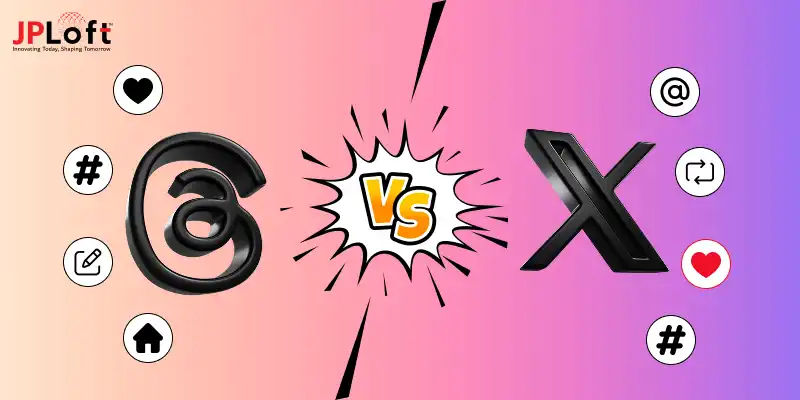


Share this blog